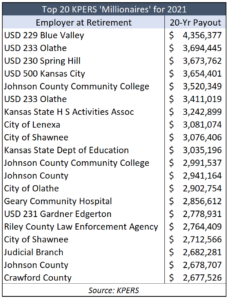Data provided by the Kansas Public Employees Retirement System shows Kansas has 3,349 KPERS ‘millionaires’ – state and local government retirees who will collect at least $1 million in pension benefits over their first 20 years of retirement. That is an increase of 356 over last year. The complete list of KPERS ‘millionaires’ can be found at KansasOpenGov.org.
 Education officials top the list of the 20 highest payouts, with the first seven positions and ten total slots. Six retired from local school districts, two from Johnson County Community College, one from the high school athletic association, and one from the Department of Education. Four of the top 20 retired from cities and three are from county employment.
Education officials top the list of the 20 highest payouts, with the first seven positions and ten total slots. Six retired from local school districts, two from Johnson County Community College, one from the high school athletic association, and one from the Department of Education. Four of the top 20 retired from cities and three are from county employment.
State law prohibits KPERS from releasing names, but it’s a pretty safe bet that the first four on the list are superintendents because they are the highest paid. Pensions are based on a final average salary over the previous few years and years of service.
The superintendent at the top of the list, who will collect $4.4 million of the first 20 years of retirement, is probably Tom Trigg. He ‘retired’ from Blue Valley in 2015 and has since been superintendent in Highland Park, Texas. Trigg was hired in 2015 at an annual salary of $325,000 plus $13,800 in car and technology allowances, and a $1.2 million interest-free loan to buy a house. His annual pension from Kansas is $217,819.
The second and sixth slots come from the Olathe school district, most likely superintendents John Allison and Marlin Berry.
The third-highest 20-year payout probably goes to USD 230 Spring Hill Superintendent Bart Goering, who will collect $3.7 million. Retired superintendent Cynthia Lane of USD 500 Kansas City, who oversaw perhaps the lowest-achieving district in Kansas, is probably the third-highest retiree and will also collect $3.7 million.
With 938 KPERS ‘millionaires, local school districts have the most of all employers. Cities have 852, counties have 704, and there are 620 KPERS ‘millionaires’ from state agencies. The balance come from community colleges and a variety of local agencies.
Government retirees in Kansas get an extra benefit in not having to pay state income tax on their pensions. They pay income tax on their own contributions, but they are never taxed on the contributions from taxpayers and earnings on all contributions.



